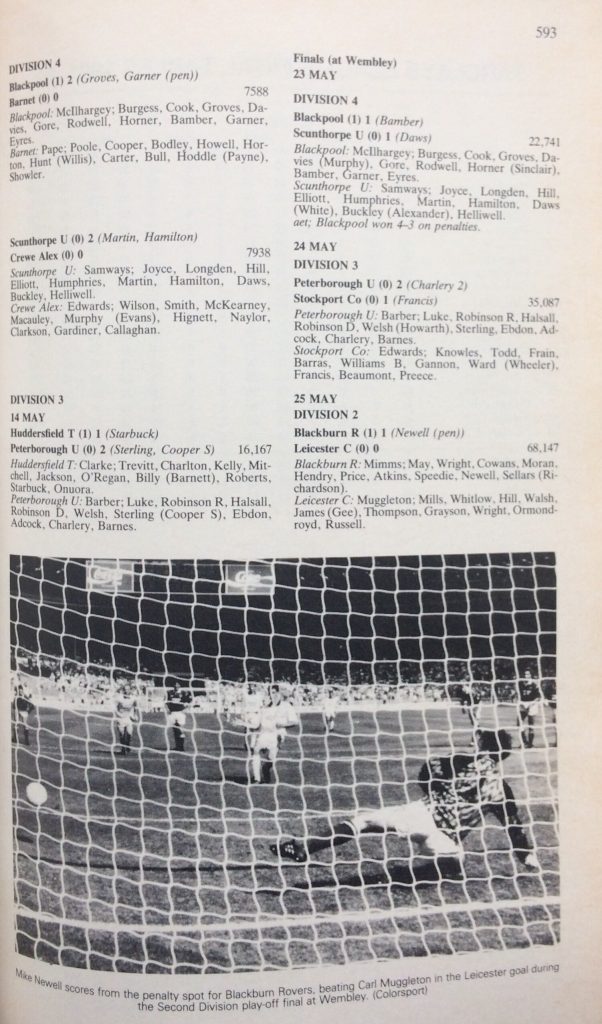The Play-Offs (Part Two): 1987-1992
The play-offs were re-introduced to the Football League almost a century after the ‘test matches’ of the 1890s. The measure was agreed at a League meeting in December 1985 as part of a package of compromise measures to prevent a ‘Super League’ breakaway of the First Division clubs.

Initially the play-offs were proposed to run for two seasons from 1986-87, to allow a reduction in the number of First Division clubs (from 22 to 20, which was later reversed). They were intended to compensate lower-division clubs for loss of income while the League was reconstructed (for the first time, there would also be automatic promotion and relegation from the Fourth Division). Brentford Chairman Martin Lange was one of the instigators of the play-offs, believing they would add excitement to the end of the league season, at a time of financial woes and dwindling attendances across the divisions. Included was the proviso that if they were to prove “popular with spectators they could become a permanent part of the calendar.”

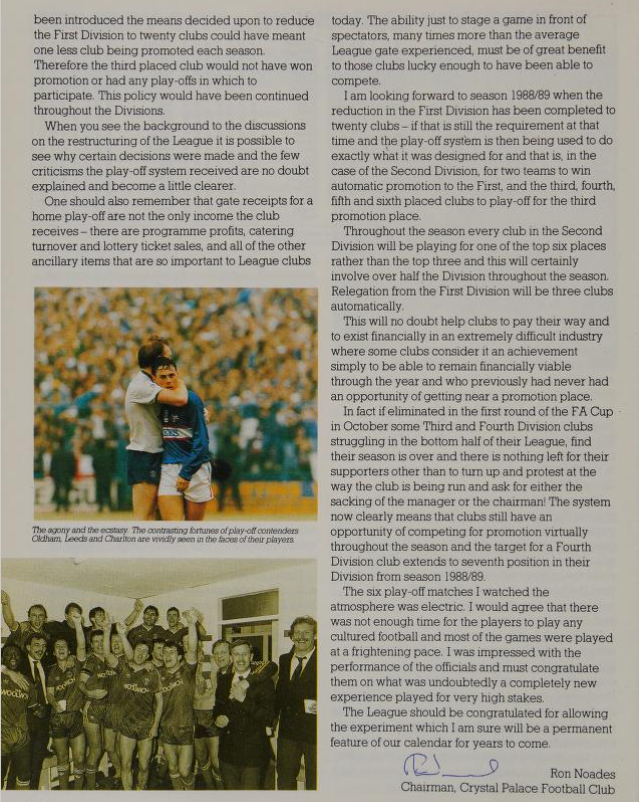
The first season saw a side from the higher division competing against lower-division clubs – as was the case for the original test matches. Semi-finals and finals were played over two legs, not without controversy. Oldham Athletic would have been promoted to the First Division after a third-place finish in any season since 1974. Facing a Leeds United side who had finished seven points below them, they conceded last-minute goals in each leg of their semi-final (both scored by Keith Edwards) and found themselves knocked out on away goals – but only after extra-time had been played. Eventually Leeds lost out in the replayed third game of a tense final, to Charlton who retained their First Division status – the only team to do so in this version of the play-offs.
Below them, Sunderland dropped into the third tier of English football for the first time after losing to Gillingham on away goals. Tony Cascarino scored the first play-off hat-trick in that tie. The Third Division final then went to a replay, as the away goals rule was not applied at this stage, denying Gillingham promotion over Swindon – winners in the replay. Football League founder members Bolton were trying to stay in the Third Division by 1986-87, while Wolves found themselves languishing in the Fourth Division (alongside fellow founders Burnley and Preston). Sixth-placed Aldershot, who finished nine points behind Wolves, beat both the famous names in the play-offs to earn promotion.
Overall, the first season saw twelve clubs compete in twenty end-of-season fixtures, with attendances averaging 15,515. When the receipts were divided, Second Division clubs each earned approximately £11,500 from the 1986-87 play-offs, with Third and Fourth Division clubs receiving £4,740 apiece.

The same format was used the following season, when Chelsea became the only team to lose their First Division status through the play-offs. After their defeat to Middlesbrough over two legs, marred by crowd trouble, clubs from the higher division were no longer involved (all three lost their ties in 1988). The Third Division play-off final again went to a replay. This time Walsall won a penalty shoot-out to determine the home venue for the third tie against Bristol City – David Kelly’s hat-trick in that game took his play-off tally to an impressive seven. In the Fourth Division, Sean McCarthy scored in all four of the end-of-season fixtures as Swansea were promoted, a unique feat in modern play-off history.
The success of the first season was consolidated, with the average attendance increased to a little over 16,000 across the nineteen fixtures. The experiment of end-of-season play-offs was to become a permanent part of the English football calendar.


The 1988-89 play-offs were the first to be contested by sides from the same division, while retaining the two-legged home and away format for both semi-final and final. Crystal Palace, Port Vale and Leyton Orient were promoted. It was the following year, 1990, when a one-off Wembley final was introduced over the late May bank holiday weekend. Putting the season’s outcome on a single game would lead to the occasion becoming one of the most dramatic – and eventually lucrative – fixtures in English football. Cambridge United’s Dion Dublin was the first play-off goalscorer at Wembley, with a winner that earned his side promotion. 1990 also saw a losing finalist promoted, when Sunderland profited from Swindon’s controversial demotion for financial irregularities despite a 1-0 Wembley defeat.
In the following year Notts County reached the top division after a second successive play-off win, while in the Fourth Division final, Torquay beat Blackpool in the first Wembley penalty shoot-out. Blackpool themselves were promoted on penalties in 1992’s final, beating Scunthorpe who had now endured four unsuccessful play-off campaigns. Meanwhile with the Premier League on the horizon another penalty, by Blackburn’s Mike Newell against Leicester, took the Lancashire club into the top flight for the first time since 1966 after play-off failures from 1988 to 1990.


The play-offs were credited with keeping more clubs interested until the end of the season, boosting attendances and revenue across the divisions. Football League Secretary Graham Kelly commented of the first season’s fixtures, that they were “tense, nail-biting affairs, heart stopping for all those directly involved but creating an explosion of interest for all the fans and a financial bonanza for the clubs.” It was already clear that the play-offs were here to stay, but their importance would only grow with the riches of the Premier League.
Since 1992, the reward of Premier League status has made the Championship play-off final ‘the world’s richest game’, with the current estimated value to the winners between £130-150 million. The play-offs are the subject of Richard Foster’s book The Agony & the Ecstasy: A Comprehensive History of the Football League Play-Offs, first published in 2015.


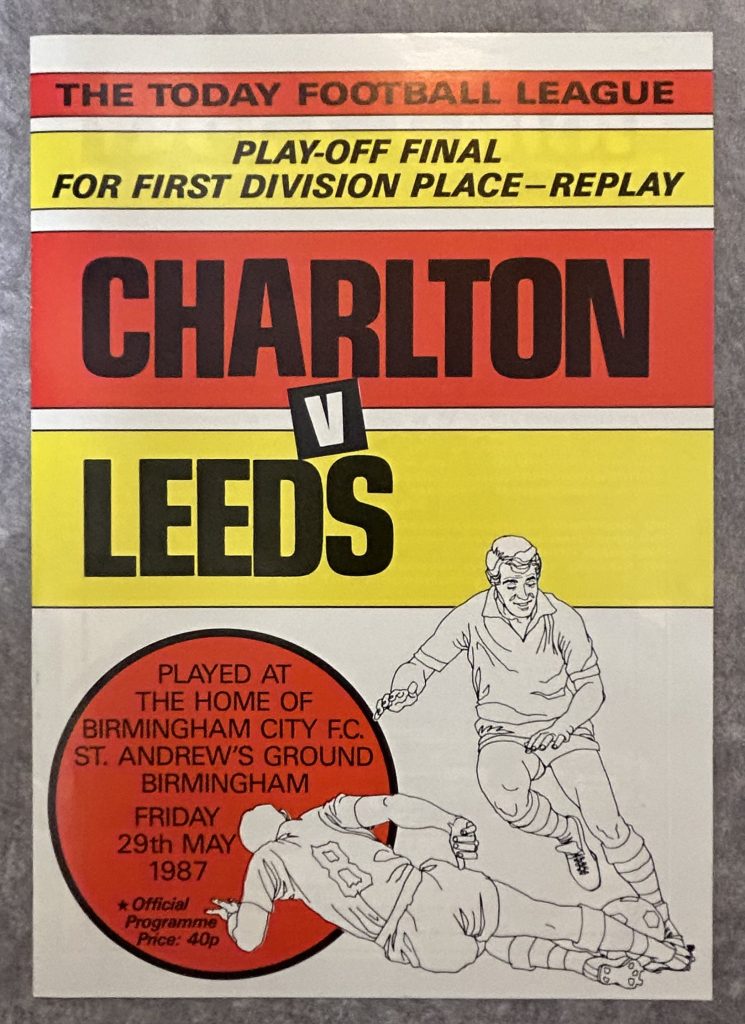
The (re)introduction of the play-offs in the 1980s is one of the topics in my book Before the Premier League: A History of the Football League’s Last Decades.



Match programmes courtesy of Miles McClagan (Flickr & twitter @TheSkyStrikers) and Peter Lythe.
Play-Off Results 1987-92
1987
Division Two
Semi-finals
Leeds (1) (1) v Oldham (0) (2) – 2-2 on aggregate; Leeds win on away goals
Ipswich (0) (1) v Charlton (0) (2)
Final
Charlton (1) (0) (2) v Leeds (0) (1) (1) – Charlton remain in Division One after replay at St. Andrew’s, Birmingham
Division Three
Semi-finals
Gillingham (3) (3) v Sunderland (2) (4) – 6-6 on aggregate; Gillingham win on away goals
Note: Tony Cascarino scored the first play-off hat-trick in the first leg
Wigan (2) (0) v Swindon (3) (0)
Final
Gillingham (1) (1) (0) v Swindon (0) (2) (2) – Swindon promoted to Division Two after replay at Selhurst Park
Division Four
Semi-finals
Colchester (0) (0) v Wolves (2) (0)
Aldershot (1) (2) v Bolton (0) (2)
Final
Aldershot (2) (1) v Wolves (0) (0) – Aldershot promoted to Division Three


1988
Division Two
Semi-finals
Bradford (2) (0) v Middlesbrough (1) (2)
Blackburn (0) (1) v Chelsea (2) (4)
Final
Middlesbrough (2) (0) v Chelsea (0) (1) – Middlesbrough promoted to Division One
Note: Chelsea were the only First Division team to be relegated via the play-offs
Division Three
Semi-finals
Notts County (1) (1) v Walsall (3) (1)
Bristol City (1) (1) v Sheffield United (0) (1)
Final
Bristol City (1) (2) (0) v Walsall (3) (0) (4) – Walsall promoted to Division Two
Note: Walsall won a penalty shoot-out after second leg to determine home venue for replay
Division Four
Semi-finals
Torquay (2) (1) v Scunthorpe (1) (1)
Swansea (1) (1) v Rotherham (0) (1)
Final
Swansea (2) (3) v Torquay (1) (3) – Swansea promoted to Division Three
Note: Sean McCarthy scored in all four play-off games for Swansea


1989
Division Two
Semi-finals
Blackburn (0) (1) v Watford (0) (1) – 1-1 on aggregate; Blackburn win on away goals
Swindon (1) (0) v Crystal Palace (0) (2)
Final
Blackburn (3) (0) v Crystal Palace (1) (3) – Crystal Palace promoted to Division One
Division Three
Semi-finals
Bristol Rovers (1) (4) v Fulham (0) (0)
Preston (1) (1) v Port Vale (1) (3)
Final
Bristol Rovers (1) (0) v Port Vale (1) (1) – Port Vale promoted to Division Two
Division Four
Semi-finals
Leyton Orient (2) (0) v Scarborough (0) (1)
Wrexham (3) (2) v Scunthorpe (1) (0)
Final
Wrexham (0) (1) v Leyton Orient (0) (2) – Leyton Orient promoted to Division Three

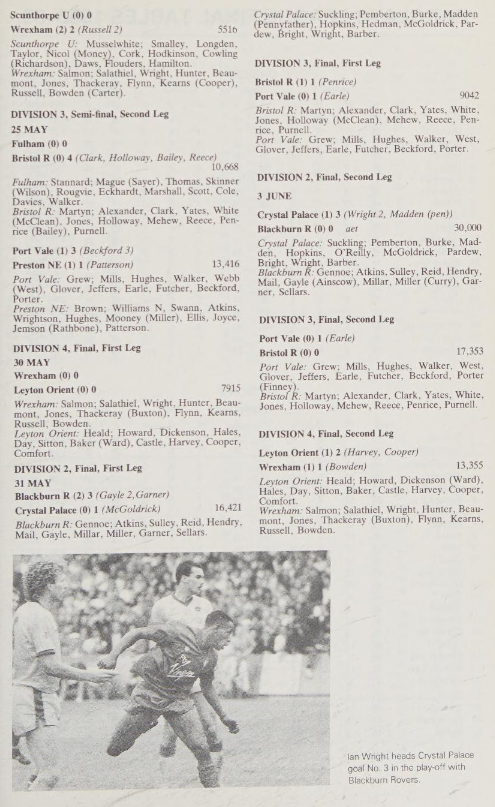

1990
Division Two
Semi-finals
Sunderland (0) (2) v Newcastle (0) (0)
Blackburn (1) (1) v Swindon (2) (2)
Final (at Wembley Stadium)
Sunderland (0) v Swindon (1) – Sunderland promoted to Division One
Note: Losing finalists Sunderland promoted after Swindon’s demotion
Division Three
Semi-finals
Bolton (1) (0) v Notts County (1) (2)
Bury (0) (0) v Tranmere (0) (2)
Final (at Wembley Stadium)
Notts County (2) v Tranmere (0) – Notts County promoted to Division Two
Division Four
Semi-finals
Cambridge (1) (2) v Maidstone (1) (0)
Chesterfield (4) (2) v Stockport (0) (0)
Final (at Wembley Stadium)
Cambridge (1) v Chesterfield (0) – Cambridge promoted to Division Three


1991
Division Two
Semi-finals
Brighton (4) (2) v Millwall (1) (1)
Middlesbrough (1) (0) v Notts County (1) (1)
Final (at Wembley Stadium)
Brighton (1) v Notts County (3) – Notts County promoted to Division One
Note: Notts County became the first team to win back-to-back promotions through the play-offs
Division Three
Semi-finals
Bury (1) (0) v Bolton (1) (1)
Brentford (2) (0) v Tranmere (2) (1)
Final (at Wembley Stadium)
Bolton (0) v Tranmere (1) – Tranmere promoted to Division Two
Division Four
Semi-finals
Scunthorpe (1) (1) v Blackpool (1) (2)
Torquay (2) (0) v Burnley (0) (1)
Final (at Wembley Stadium)
Blackpool (2) v Torquay (2) – Torquay win 5-4 on penalties and are promoted to Division Three
Note: the first penalty shoot-out in a Wembley play-off final


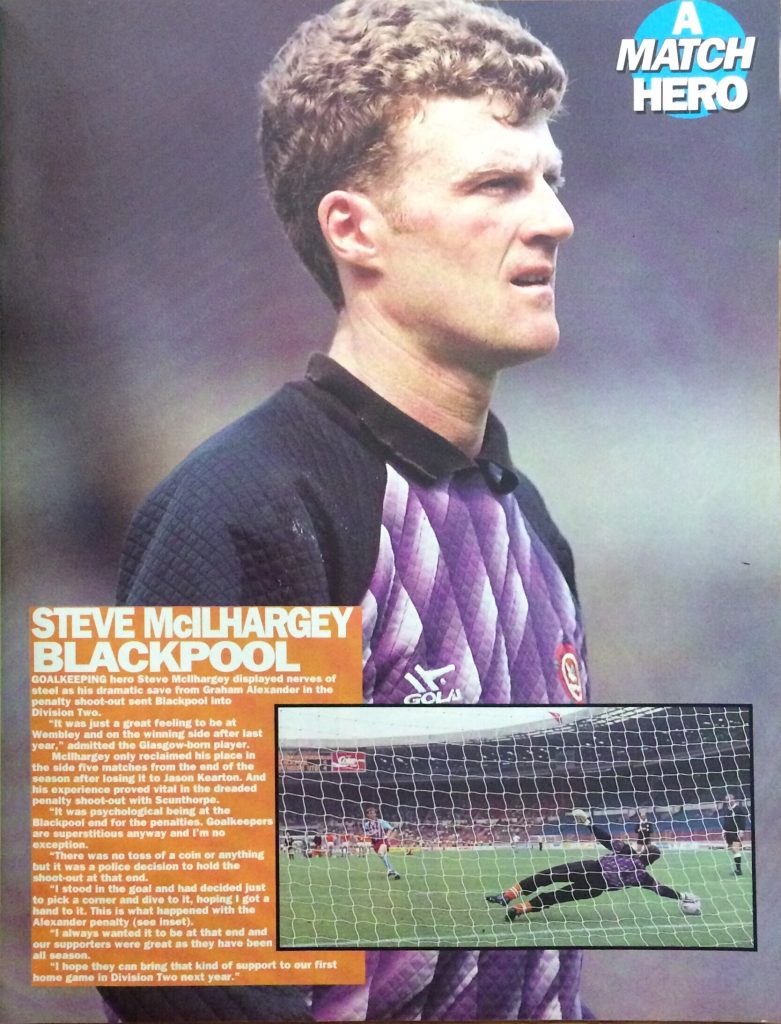
1992 play-offs (Match magazine)



1992
Division Two
Semi-finals
Cambridge (1) (0) v Leicester (1) (5)
Blackburn (4) (1) v Derby (2) (2)
Final (at Wembley Stadium)
Blackburn (1) v Leicester (0) – Blackburn promoted to Division One
Note: Blackburn promoted via the play-offs at the fourth attempt
Division Three
Semi-finals
Stockport (1) (1) v Stoke (0) (1)
Peterborough (2) (2) v Huddersfield (2) (1)
Final (at Wembley Stadium)
Peterborough (2) v Stockport (1) – Peterborough promoted to Division Two
Division Four
Semi-finals
Barnet (1) (0) v Blackpool (0) (2)
Crewe (2) (0) v Scunthorpe (2) (2)
Final (at Wembley Stadium)
Blackpool (1) v Scunthorpe (1) – Blackpool win 4-3 on penalties and are promoted to Division Three

